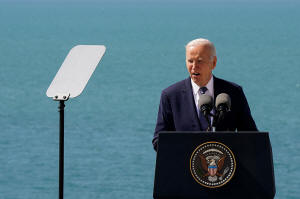Biden asks Americans to recommit to democracy in Normandy cliff speech
 Send a link to a friend
Send a link to a friend
 [June 08, 2024]
By Jeff Mason [June 08, 2024]
By Jeff Mason
POINTE DU HOC, France (Reuters) -Atop the cliff that U.S. Army Rangers
scaled 80 years ago on D-Day, President Joe Biden on Friday compared the
threats posed by Nazi Germany to those facing the world today by
dictators and authoritarianism, and urged Americans to resist
isolationism.
Biden's speech in Normandy, his second in as many days, sought to
strengthen support for Ukraine, which is locked in a war with Russia and
its President Vladimir Putin, and bolster democratic ideals at home.
Biden said the Army Rangers who fought that day would want Americans to
defend freedom.
"Does anyone doubt that they would want America to stand up against
Putin’s aggression here in Europe today?" he asked.
Biden never mentioned his Republican rival in the Nov. 5 presidential
election, Donald Trump, but his speech criticized the former president's
isolationist inclinations.
"The most natural instinct is to walk away, to be selfish, to force our
will upon others, to seize power and never give up," Biden said, in an
apparent dig at Trump. "American democracy asks the hardest of things:
to believe that we're part of something bigger than ourselves."
Biden urged Americans to remember the Rangers whose dramatic heroism on
D-Day helped make the invasion a success.
"As we gather here today, it’s not just to honor those who showed such
remarkable bravery on that day, June 6, 1944," Biden said. "It’s to
listen to the echo of their voices. To hear them... They’re not asking
us to scale these cliffs, but they’re asking us to stay true to what
America stands for."

On June 6, 1944, the elite Ranger troops scaled the 100-foot (30-meter)
cliffs overlooking Omaha Beach under withering gunfire and seized German
artillery pieces that could have fired on American troops coming ashore
at Omaha and nearby Utah Beach.
By setting his speech at Pointe du Hoc, Biden echoed Republican
predecessor Ronald Reagan, who marked D-Day's anniversary there 40 years
before. Reagan said democracy was "worth dying for" and emphasized an
American desire for peace in what turned out to be the waning years of
the Cold War.
Biden's goal was to draw a "through line" from World War Two, connecting
the Cold War, the establishment of the NATO military alliance and
Russia's current war with Ukraine, White House national security adviser
Jake Sullivan said.
"We’re the fortunate heirs of a legacy of these heroes, those who scaled
the cliffs at Pointe du Hoc. But we must also be the keepers of their
mission," Biden said.
[to top of second column]
|

U.S. President Joe Biden delivers remarks at the World War II Pointe
du Hoc Ranger Monument following the 80th anniversary of the 1944
D-Day landings in Cricqueville-en-Bessin, Normandy, France, June 7,
2024. REUTERS/Elizabeth Frantz

CONTRAST WITH TRUMP
The U.S. president is in the middle of a five-day trip to France, a
rare excursion abroad during an election year in which he faces a
tight race against Trump, a Republican who has threatened to use a
second four-year term to punish political rivals, deport immigrants
and upend global alliances.
Trump has criticized the cost of supporting Ukraine after Russia's
invasion, proposed higher tariffs as part of an "America First"
policy and questioned America's decades-long commitment to NATO,
saying European members are not paying their fair share.
On Thursday, Biden made an impassioned call for the defense of
freedom and urged Western powers to stand by Ukraine in its fight
with Russia.
The D-Day anniversary on June 6 and surrounding events are part of
Biden's presidential duties, not campaign events. But they gave him
a chance to contrast himself with Trump.
Biden, at 81 the oldest to serve in the office, has sought to rebut
concerns about his age by focusing on the potential impact Trump,
77, could have during a second term.
The Democratic incumbent has characterized Trump, whose supporters
raided the U.S. Capitol after the Republican declined to accept his
2020 election loss, as a threat to U.S. democracy.
Meanwhile, hard-right parties are gaining ground in Europe, and
Russia's President Putin said on Wednesday he could deploy
conventional missiles within striking distance of the United States
and its allies if they allowed Ukraine to strike deeper into Russia
with long-range Western weapons.
"This will hit the core messages that Biden is wanting to highlight
during his re-election campaign but also has real resonance still in
Europe as well," said Max Bergmann, director of the Europe, Russia,
and Eurasia Program at the Center for Strategic & International
Studies.
Biden met with World War Two veterans in Normandy on Thursday and
with Ukrainian President Volodymyr Zelenskiy on Friday.
(Reporting by Jeff Mason; Editing by Heather Timmons, Cynthia
Osterman, Jonathan Oatis and Diane Craft)
[© 2024 Thomson Reuters. All rights reserved.]This material
may not be published, broadcast, rewritten or redistributed.
Thompson Reuters is solely responsible for this content. |